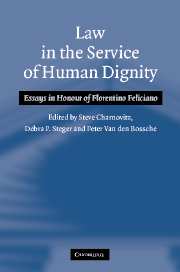Book contents
- Frontmatter
- Contents
- List of contributors
- Preface
- Biographical note
- List of abbreviations
- PART I Reflections on the contributions of Florentino Feliciano to international law
- PART II Insights into the World Trade Organization
- 5 Justice Feliciano and the WTO environmental cases: laying the foundations of a ‘constitutional jurisprudence’ with implications for developing countries
- 6 International trade law, human rights and theories of justice
- 7 Developing countries and the international trading system
- 8 North–South issues of foreign direct investments in the WTO: is there a middle-of-the-road approach?
- 9 The participation of developing countries in WTO dispute settlement and the role of the Advisory Centre on WTO Law
- 10 Reform of the WTO dispute settlement system: what to expect from the Doha Development Round?
- 11 Interpretation and Application of WTO Rules: Florentino Feliciano and the First Seven
- 12 Dispute settlement in the WTO: on the trail of a court
- 13 A proposal to introduce an Advocate General's position into WTO dispute settlement
- 14 Arbitration at the WTO: a terra incognita to be further explored
- 15 The challenges to the legitimacy of the WTO
- 16 The World Trade Organization after Cancún
- PART III The changing landscape of investment arbitration
- PART IV New challenges in international adjudication
- Bibliography of works by Florentino Feliciano
- Index
10 - Reform of the WTO dispute settlement system: what to expect from the Doha Development Round?
from PART II - Insights into the World Trade Organization
Published online by Cambridge University Press: 29 July 2009
- Frontmatter
- Contents
- List of contributors
- Preface
- Biographical note
- List of abbreviations
- PART I Reflections on the contributions of Florentino Feliciano to international law
- PART II Insights into the World Trade Organization
- 5 Justice Feliciano and the WTO environmental cases: laying the foundations of a ‘constitutional jurisprudence’ with implications for developing countries
- 6 International trade law, human rights and theories of justice
- 7 Developing countries and the international trading system
- 8 North–South issues of foreign direct investments in the WTO: is there a middle-of-the-road approach?
- 9 The participation of developing countries in WTO dispute settlement and the role of the Advisory Centre on WTO Law
- 10 Reform of the WTO dispute settlement system: what to expect from the Doha Development Round?
- 11 Interpretation and Application of WTO Rules: Florentino Feliciano and the First Seven
- 12 Dispute settlement in the WTO: on the trail of a court
- 13 A proposal to introduce an Advocate General's position into WTO dispute settlement
- 14 Arbitration at the WTO: a terra incognita to be further explored
- 15 The challenges to the legitimacy of the WTO
- 16 The World Trade Organization after Cancún
- PART III The changing landscape of investment arbitration
- PART IV New challenges in international adjudication
- Bibliography of works by Florentino Feliciano
- Index
Summary
Introduction
The WTO dispute settlement system has been operational for almost nine years now. In that period it has arguably been the most prolific of all state-to-state dispute settlement systems. Since 1 January 1995, 302 disputes have been brought to the WTO system for resolution. That is more than were brought to the GATT, the WTO's predecessor, in the forty-seven years between 1948 and 1995. In almost one-quarter of the disputes brought to the WTO system, the parties were able to reach an amicable solution through consultations, or the dispute was resolved otherwise without recourse to adjudication. In other disputes, parties have resorted to adjudication and, to date, such adjudication procedures have been completed in more than seventy-three disputes.
Some of the disputes dealt with by the WTO dispute settlement system have triggered considerable controversy and public debate and have attracted much media attention. This has been the case, for example, for disputes on national legislation or other measures for the protection of public health or the environment, such as:
the EC – Hormones dispute on the European Union's import ban on meat from cattle treated with growth hormones;
the US – Shrimp dispute on the American import ban on shrimp harvested with nets that killed sea turtles;
the EC – Asbestos dispute on a French ban on asbestos and asbestos-containing products;
[…]
- Type
- Chapter
- Information
- Law in the Service of Human DignityEssays in Honour of Florentino Feliciano, pp. 103 - 126Publisher: Cambridge University PressPrint publication year: 2005
- 1
- Cited by



